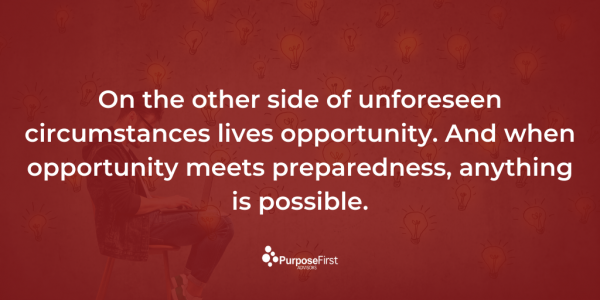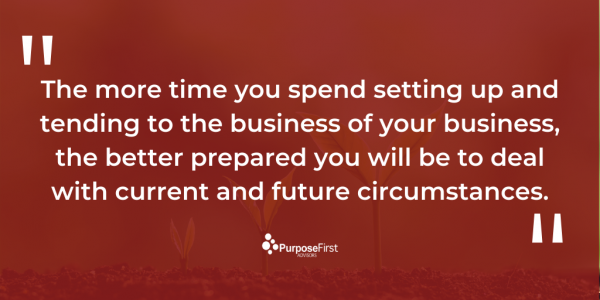When Opportunity Meets Preparedness – Small Business Advice
I recently shared a story about preparedness on LinkedIn. It was my first startup and there was no plan in place for a crisis, when our offices suddenly flooded. But we were lucky. With a quick look at who and what was mission-critical, and access to our data in the cloud, there was no downtime at all. It was work, as usual, the very next day.
In that case, I learned the value of being prepared for the unexpected—particularly the adverse circumstances we may face as business leaders and owners like the unprecedented health and economic situation we are all currently facing.
And while contingency plans for a crisis are important—and completely necessary—there are other types of preparedness we must choose as leaders. Preparation for growth, change, and opportunities, just to name a few.
Right now, the most important level of preparedness for many is having the basic infrastructure in place so they can quickly apply for and use economic relief resources. Up-to-date financial information, accurate tax filings, consistent documentation of owner’s draws, readily accessible copies of corporate documents, financial forecasts, proper insurance coverage, established relationships with bankers, lawyers, accountants, and other advisors—these are among the basic requirements for sound business operations, and prerequisites for loan applications. It’s not too late to get your house in order.
Looking ahead, we know there will be a time when the challenges are less dramatic, stressful, and threatening. On the other side of unforeseen circumstances lives opportunity. And when opportunity meets preparedness, anything is possible.
If I Had a Million Dollars…
One of the biggest opportunities we seek in business is that of additional profit and capital, or, simply put; money. We need money in order to upgrade, expand, hire, innovate, and grow. But what happens if we aren’t prepared to take effective action when the opportunity for more money comes our way? For many of us, that day may feel far off, but there are sectors where demand has increased exponentially and where demand will return faster than others.
Preparing for the opportunity to secure and deploy capital goes beyond maintaining the status quo. It requires you to envision how you will use the money to sustain growth and profitability.
Now is the time to get in the habit of developing financial scenarios—forecasts that document your assumptions about revenue and expenses in a given quarter, year, or period. You’ll use a combination of historical data (your financial statements), your knowledge of the current market situation (external factors), and your best assumptions based on your strategy (internal factors). Since no one has a crystal ball, you need to run best, average, and worst-case scenarios to stress test your assumptions and plan. Document your assumptions, and review and update on a regular basis.
It’s a skill that requires practice and a willingness to be unflinching when assessing the internal and external factors impacting your business. But doing so allows you to identify when to stay the course, pivot, or bailout. Most people don’t do forecasting alone.

Why Preparedness is the Key
We think money is the answer. Our thought process says, If I had more of it, life would be better, easier, less complicated.
What we know in business and in life, however, is that more money doesn’t always lead to the outcomes we desire. When money is infused into broken systems, it is used up before it can lead to lasting change. We see this when lottery winners who go broke, and venture-backed firms go bankrupt.
Not all money is good money. And money without a plan can be worse than no money at all. Even money intended to help us stabilize our businesses, keep people employed, and survive the current crisis may have unintended consequences. It is easier to evaluate new opportunities when you already have people and processes in place.
The more time you spend setting up and tending to the business of your business, the better prepared you will be to deal with current and future circumstances. Spend some time:
- Defining your mission and vision — they help guide your decision-making, financial and otherwise
- Defining your strategy — the ways you plan to achieve your goals
- Identifying key metrics and milestones
- Running different scenarios — staffing, product and service lines, sales and promotions, strategic partnerships, etc.
- Evaluating strategic investments and expenses
- Reviewing your income statement, balance sheet, and cash flow reports monthly
- Reviewing/updating your general ledger codes — if you are receiving assistance (e.g. PPP, EIDL), you will need to be meticulous in your record-keeping
- Creating/maintaining key relationships — bankers, lawyers, accountants, tax preparers, insurance agents, professional associations, etc. These relationships don’t necessarily require retainers and are critical even for solopreneurs
- Compiling/updating legal business documents — formation, ownership, financial, tax, banking, insurance, business plans, etc.
- Familiarizing yourself with local, state, and federal business programs and agencies — get on mailing lists, read FAQs, attend webinars to stay up-to-date on regulations, legislation, support services, and other resources
Every action, every decision should be based on a clear vision backed by a specific strategy and well-defined roles for everyone involved. Bad decisions (which will happen) are costly and need to be minimized. While a lack of money is problematic, it does require us to be creative, resourceful, and resilient as we work on being prepared for the future.
Money, on the other hand, can give us the freedom to be less precise. This is particularly true when we get an influx of money without preparation. It allows us to make decisions that feel good, productive, and important. But decisions that aren’t necessarily strategic and effective.
Being prepared lets you be resourceful, creative, and strategic with as much information and foresight as possible.

Building a Contingency Plan for Opportunity
Whether you are executing a pivot—changing product or service lines, targeting a new market, exploring a new territory, moving to a new sales channel—or are focused on surviving, planning now can help you thrive later. As is often the case in business, the money likely won’t come unless you can demonstrate to yourself and others how that money will allow you to accelerate success and create sustainable profitability.
Don’t do it alone. Lean into your peers, mentors, advisors, trusted friends, leadership team, and professional experts to share ideas, test assumptions, and talk things through. You need a variety of perspectives and specialties to understand and respond to the complex opportunities before us. Whatever our new normal ends up being, it will require new plans, skill sets, expertise, and resources. Let the hard work you are doing now—to react and respond to the unforeseen and unprecedented—lead you to think about the plan you need to have in place for the opportunities of tomorrow.
Purpose First Advisors supports small businesses, growth-stage companies, and entrepreneur support organizations by providing strategic business consulting and coaching. Contact us to learn more or to book a consultation with our team.
Media Contact
Company Name: Purpose First Advisors
Contact Person: Media Relations
Email: Send Email
Phone: 314-703-1790
Country: United States
Website: https://purposefirstadvisors.com/

